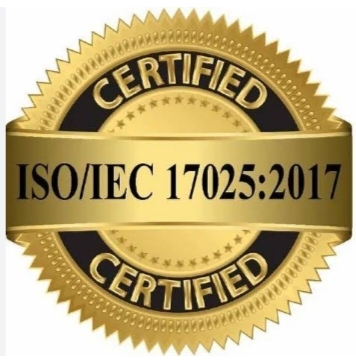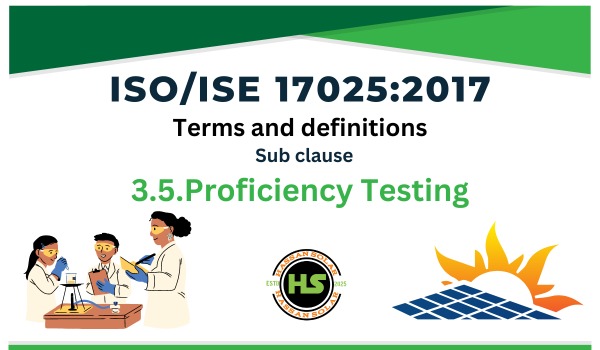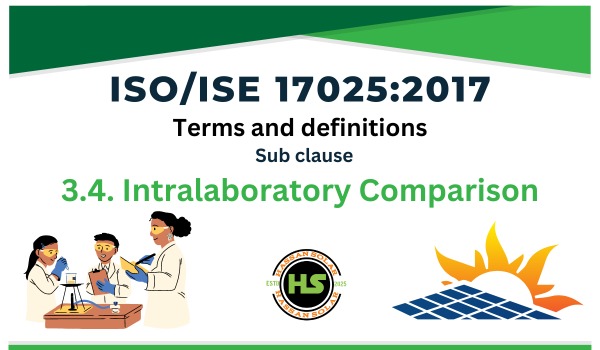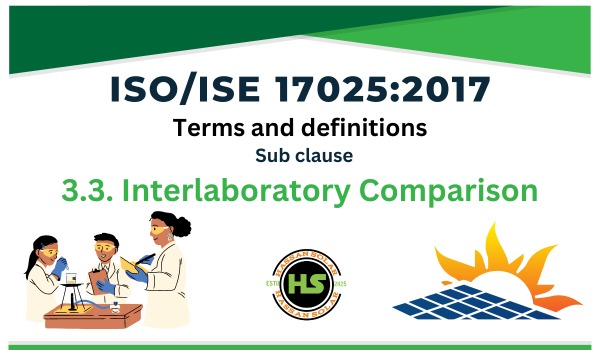Why ISO/IEC 17025:2017 ?
- ISO/IEC 17025:2017 enable laboratories to demonstrate it operate competency and generate valid results . it will optimise confidence of there work both nationally and around the world.
- It will help for NABL Accreditation.
- It is also helpful for BIS recognition.
- As it is the international standard for laboratory testing and calibration. Its need arises from the importance of ensuring laboratory competence, reliability, and consistency in producing accurate results.
Here some details explanation has given following…
- Global Recognition: ISO/IEC 17025:2017 provides a globally recognized framework for laboratory accreditation, facilitating international trade, and collaboration.
- Competence and Reliability: The standard ensures laboratories demonstrate technical competence, management system effectiveness, and produce reliable results.
- Risk Management: ISO/IEC 17025:2017 emphasizes risk management, addressing potential sources of error, and ensuring laboratories take proactive measures.
- Improved Quality: The standard promotes a culture of quality, driving laboratories to continually improve processes, and maintain high standards.
- Enhanced Credibility: Accreditation to ISO/IEC 17025:2017 enhances laboratory credibility, reassuring customers, and stakeholders of the laboratory’s capabilities.
- Regulatory Compliance: The standard helps laboratories meet regulatory requirements, reducing the risk of non-compliance, and associated consequences.
- Facilitates Innovation: By ensuring laboratories operate at the highest level, ISO/IEC 17025:2017 facilitates innovation, supporting the development of new technologies, and products.
- Supply Chain Assurance: The standard provides assurance throughout the supply chain, from raw materials to final products, ensuring quality, and reliability.
- Environmental and Safety Benefits: ISO/IEC 17025:2017 promotes environmental and safety awareness, encouraging laboratories to minimize their environmental impact, and ensure a safe working environment.
- Continuous Improvement: The standard encourages continuous improvement, driving laboratories to stay up-to-date with technological advancements, and best practices
In conclusion ISO/IEC 17025:2017 is necessary to ensure laboratory competence, reliability, and consistency, promoting a culture of quality, risk management, and continuous improvement, ultimately facilitating global recognition, and credibility.
1.Scope of ISO/IEC 17025:2017
The scope of ISO/IEC 17025:2017 is to specify the general requirements for the competence, impartiality, and consistent operation of laboratories, including testing and calibration laboratories.
- Competence: The ability to do something successfully.
- Impartiality: Equal tritment of all disputants, fairness and neutral.
- Consistent: Always have the same opinion , behaviour , not changing.
This document is applicable to all organization performing laboratory activities , regardless of the number of personnel, including:
- Testing laboratories: All materials and products which can be tested or systems and provide results, including physical, chemical, biological, and other types of testing.
- Calibration laboratories: All applies that calibrate measurement instruments or equipment , including those performing physical, electrical, and other calibration services.
- Sampling laboratories: Those that perform sampling activities.
- Certification laboratories: Those that issue certificates of conformity.
The scope of ISO/IEC 17025:2017 including.
- Management system Requirements: Ensuring the laboratory has the standard includes requirements for the laboratory’s management system, focusing on quality management, risk management, and continual improvement. It aligns with the high-level structure of ISO management system standards, such as ISO 9001:2015.
- Organization and Management: Defines the laboratory’s organizational structure, management responsibilities, and the need for effective communication and documented information.
- Document Control: Ensures that laboratory documents are controlled and updated as necessary.
- Internal Audits: Requires regular internal audits to assess the effectiveness of the management system.
- Management Reviews: Mandates periodic reviews by management to ensure the system’s continued suitability and effectiveness
- Personnel Requirements: Ensure that there laboratory personnel staff are appropriately qualified, trained, competent for their tasks and impartial.
- Facilities and Environmental condition: Ensuring laboratories have suitable facilities and control environmental conditions that could affect test and calibration results.
- Equipment Requirements: Laboratories must use equipment that is appropriate for the tasks and ensure that it is properly maintained maintenance and calibrated
- Test and calibration method requirements: Requires validation of testing and calibration methods to ensure they are fit for their intended purpose and also ensuring laboratories use valid and reliable methods. Establishes procedures for handling, transportation, and storage of items to ensure that their condition is not adversely affected.
- Sampling requirements: Ensuring laboratories follow proper sampling procedures.
- Measurement traceability requirements:Ensuring measurements are traceable to international standards.
- Reporting requirements: Ensuring laboratories issue accurate results must be reported accurately, with clear documentation and traceability.
- Impartiality and Confidentiality: Ensuring laboratories maintain impartiality and confidentiality by impartial manner to avoid conflicts of interest and ensure the integrity of results.
- Continuous improvement requirements: Ensuring laboratories emphasizes the need for ongoing evaluation and improvement of laboratory processes and performance.
By applying the requirements of ISO/IEC 17025:2017, laboratories demonstrate their ability to produce accurate, reliable, and consistent results, which is essential for:
- Regulatory compliance
- International trade
- Certification and accreditation
- Research and development
- Quality control and assurance
- Environmental monitoring
- Public health and safety
In conclusion , the scope of ISO/IEC 17025:2017 is to ensure the competence, impartiality, and consistent operation of laboratories, covering all aspects of laboratory activities, and applying to various types of laboratories worldwide.
2.Normative Reference:
This is the second clause of ISO/IEC 17025:2017 is the international standard and documents that are referenced in the text of the standard and are essential for its application. These references provide additional details, requirements, or guidance that support the implementation of ISO/IEC 17025:2017.
The Normative References of ISO/IEC 17025:2017 include:
- ISO/IEC 17000:2004: Conformity assessment -This standard defines the vocabulary and general principles related to conformity assessment. It helps ensure a common understanding of terms and concepts used in conformity assessments, which is crucial for the effective implementation of ISO/IEC 17025:2017.
- ISO/IEC 17011:2017 –This standard specifies the requirements for accreditation bodies that assess and accredit other conformity assessment bodies, including laboratories. It provides the framework for the accreditation process and helps ensure that accreditation bodies operate consistently and impartially.
- ISO/IEC Guide 98-3:2008 – This guide provides the principles for expressing measurement uncertainty. It is essential for laboratories to accurately report uncertainty in their measurements, which is a key component of maintaining the credibility and reliability of their results.
- ISO 9001: Quality management systems – Requirements
- ISO/IEC Guide 99:2007 :International vocabulary of metrology – Basic and general concepts and associated terms (VIM)
- ISO Guide 34: General requirements for the competence of reference material producers
- ISO/IEC 17034: General requirements for the competence of reference material producers
- ISO 10012: Measurement management systems – Requirements for measurement processes and measuring equipment
- ISO/IEC 17020: Conformity assessment – Requirements for the operation of various types of bodies performing inspection
These Normative References cover aspects such as:
- Vocabulary and terminology
- Quality management systems
- Metrology and measurement principles
- Reference materials and standards
- Measurement management systems
- Inspection and conformity assessment
By referencing these international standards and documents, ISO/IEC 17025:2017 ensures that laboratories follow established principles, guidelines, and requirements, promoting consistency, accuracy, and reliability in their operations.
In conclusion, the Normative References of ISO/IEC 17025:2017 provide essential support and guidance for laboratories to demonstrate their competence, impartiality, and consistent operation, and are crucial for the effective implementation of the standard.



